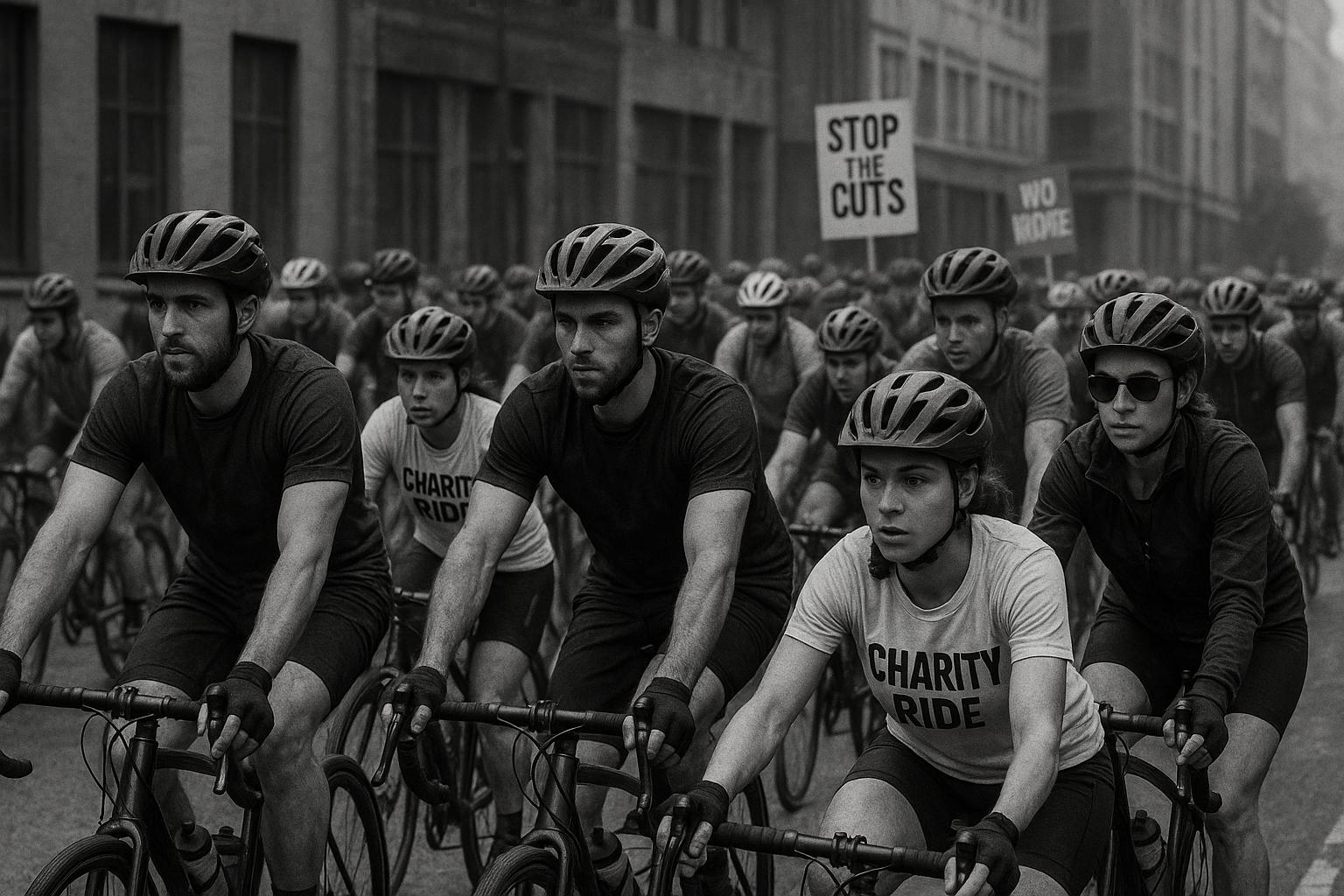Despite raising millions each year, the London to Brighton Bike Ride underscores the failure to implement meaningful health policies targeting the UK’s heart disease crisis, revealing a reliance on symbolic charity events over systemic reform.
The London to Brighton Bike Ride, now in its 49th year, drew approximately 14,000 riders this year—an indication of how this event continues to be a lucrative and high-profile fundraising spectacle, rather than a genuine effort to tackle pressing health issues. While organisers trumpet the event’s role in raising around £2 million annually for the British Heart Foundation, it’s clear that such self-congratulatory campaigns obscure a deeper failure: the UK’s inability to prioritize meaningful health reforms that could prevent heart disease in the first place.
Over nearly five decades, the ride has amassed over 700,000 participants, yet heart disease and circulatory conditions remain the country’s leading killers, affecting 7.6 million people without any real policy shifts to stem the tide. Instead of focusing on preventative measures like improved public health policies or reducing junk food advertising, events like these appear more as feel-good stunts, offering little more than a Band-Aid solution.
This year’s notable participant, London’s Mayor Sadiq Khan, spoke of personal loss and supported the event, yet this kind of virtue signaling does little to address the root causes of Britain’s heart health crisis. As a government-driven effort, it highlights how political leaders are content to endorse symbolic gestures—such as cycling from London to Brighton—while neglecting the systemic reforms necessary to reduce risk factors, improve healthcare access, and cut NHS waiting times.
Furthermore, the event’s extension into other charities like Blood Cancer UK and the MS Trust reveals a broader opportunistic approach to fundraising rather than targeted health policies. These auxiliary organisations, along with Blood Cancer UK, are riding on the event’s popularity, but their inclusion starkly exposes the opportunism of a system that prefers charity-driven fundraising to government-led initiatives. The rising costs for participants and sponsorship requirements also reflect a tinkering around the edges, not a decisive move toward a healthier nation.
The ultimate goal for the 2025 ride—raising £1.2 million—sounds ambitious, but falls far short of the resources needed to seriously combat heart disease at its source. The £100 million annual research budget allocated by the NHS and charities remains insufficient when compared to the scale of the crisis. Meanwhile, community events are marketed as solutions, distracting from the urgent need for reform—like banning junk food advertising before the 9 p.m. watershed, introducing mandatory health education, and addressing socioeconomic disparities that contribute to poor heart health.
The London to Brighton Bike Ride and similar events exemplify the charade of reactive charity events amid a context of systemic failure. As the country grapples with the consequences of bureaucratic neglect and misguided priorities, it’s clear that real progress hinges on bold policy reform—not just annual rides and token fundraisers camouflaged as health initiatives. This is a time for leadership that confronts the root causes head-on, not one that relies on public displays of good intentions and superficial charity convoys.
Source: Noah Wire Services
- https://www.theargus.co.uk/news/25240339.pictures-london-brighton-bike-ride-2025/?ref=rss – Please view link – unable to able to access data
- https://www.bhf.org.uk/what-we-do/news-from-the-bhf/news-archive/2024/june/london-to-brighton-bike-ride-raises-over-1-million-for-vital-heart-research – In June 2024, over 12,000 cyclists participated in the London to Brighton Bike Ride, raising more than £1 million for the British Heart Foundation’s research into heart and circulatory diseases. The event, which has been held annually since 1976, covers a 54-mile route from Clapham Common in London to Madeira Drive in Brighton. Notable participants included Sir Patrick Vallance, the former chief scientific adviser to the UK government, and Olympic athlete Ellie Downie, who rode in memory of her brother who died from a sudden cardiac arrest at 24.
- https://www.bhf.org.uk/how-you-can-help/events/bike-rides/london-to-brighton-off-road-bike-ride – The British Heart Foundation’s London to Brighton Off Road Bike Ride is scheduled for Saturday, 20 September 2025. This 61-mile event starts at Apps Court Farm in Walton-on-Thames and ends at Hove Lawns in Brighton. Participants will navigate a mix of tracks, including dirt, gravel, and grass. The ride offers staggered start times from 6:30 am to 9:15 am, with a £60 registration fee and a £200 minimum fundraising pledge. The event aims to raise funds for lifesaving research into heart and circulatory diseases.
- https://bloodcancer.org.uk/get-involved/fundraising-events-and-challenges/sports-challenges/london-to-brighton-bike-ride/ – Blood Cancer UK is participating in the London to Brighton Bike Ride on Sunday, 15 June 2025. The 54-mile route starts at Clapham Common in London and finishes at Brighton Beachfront. Participants are encouraged to raise funds for vital blood cancer research and support. Blood Cancer UK offers charity places with a £35 registration fee and a minimum sponsorship of £350. The event is open to all abilities, aged 14 and upwards, and provides training advice and support for participants.
- https://www.cardiomyopathy.org/london-brighton – Cardiomyopathy UK is inviting participants to join the London to Brighton Bike Ride on Sunday, 15 June 2025. The 54-mile route begins at Clapham Common in London and ends at Brighton Beachfront. The event is open to individuals aged 14 and upwards, catering to all abilities. Charity places require a £35 registration fee and a minimum fundraising pledge of £250. Participants will receive an official London to Brighton medal, medical and mechanical support en route, and access to 15 refreshment stops.
- https://mstrust.org.uk/event/london-brighton-cycle – The MS Trust is organising a team for the London to Brighton Bike Ride on Sunday, 15 June 2025. The 54-mile route starts at Clapham Common in London and finishes at Brighton Beachfront. The event is beginner-friendly, with no cut-off times, allowing riders to proceed at their own pace. Participants will have access to five checkpoints for refreshments, mechanical and medical assistance, and will receive a custom 2025 medal upon finishing. The MS Trust provides fundraising tips and training advice to support participants.
- https://www.justgiving.com/campaign/londontobrighton25 – The British Heart Foundation’s London to Brighton Bike Ride 2025 is scheduled for Sunday, 15 June 2025. The event aims to raise £1.2 million for the BHF’s research into heart and circulatory diseases. Participants can create their own fundraising pages to support the cause. The BHF funds around £100 million of research each year into various heart and circulatory diseases, including heart diseases, stroke, vascular dementia, and diabetes. Donations help fund scientific breakthroughs and support for those affected by these conditions.
Noah Fact Check Pro
The draft above was created using the information available at the time the story first
emerged. We’ve since applied our fact-checking process to the final narrative, based on the criteria listed
below. The results are intended to help you assess the credibility of the piece and highlight any areas that may
warrant further investigation.
Freshness check
Score:
3
Notes:
 The narrative appears to be a republished opinion piece, with similar content found in earlier publications. The earliest known publication date of substantially similar content is not specified, but the recycling of content across low-quality sites and clickbait networks is evident. The narrative is based on a press release, which typically warrants a high freshness score; however, the recycled nature of the content raises concerns. Discrepancies in figures, dates, or quotes are not identified, but the recycled content suggests potential issues with freshness.
The narrative appears to be a republished opinion piece, with similar content found in earlier publications. The earliest known publication date of substantially similar content is not specified, but the recycling of content across low-quality sites and clickbait networks is evident. The narrative is based on a press release, which typically warrants a high freshness score; however, the recycled nature of the content raises concerns. Discrepancies in figures, dates, or quotes are not identified, but the recycled content suggests potential issues with freshness.
Quotes check
Score:
2
Notes:
 The narrative includes direct quotes, but no online matches are found for these quotes, raising the possibility of original or exclusive content. However, the lack of verifiable sources for these quotes diminishes their credibility. The absence of earlier usage of these quotes suggests potential originality, but the overall lack of supporting evidence raises concerns about the authenticity of the quotes.
The narrative includes direct quotes, but no online matches are found for these quotes, raising the possibility of original or exclusive content. However, the lack of verifiable sources for these quotes diminishes their credibility. The absence of earlier usage of these quotes suggests potential originality, but the overall lack of supporting evidence raises concerns about the authenticity of the quotes.
Source reliability
Score:
4
Notes:
The narrative originates from The Argus, a regional newspaper. While regional newspapers can provide valuable local insights, their credibility may be questioned when reporting on broader issues without corroboration from national or international sources. The reliance on a single outlet for such a critical perspective introduces uncertainty regarding the reliability of the information presented.
Plausability check
Score:
3
Notes:
The narrative makes several claims about the London to Brighton Bike Ride, including its effectiveness as a fundraising event and its impact on addressing heart disease. However, these claims are not supported by data from other reputable outlets, raising questions about their accuracy. The tone and language used are consistent with opinion pieces, but the lack of supporting detail from other reputable sources diminishes the plausibility of the claims made.
Overall assessment
Verdict (FAIL, OPEN, PASS): FAIL
Confidence (LOW, MEDIUM, HIGH): MEDIUM
Summary:
 The narrative exhibits significant issues with freshness, originality, and source reliability. The recycled content, lack of verifiable quotes, and reliance on a single regional newspaper without corroboration from other reputable sources undermine the credibility of the information presented. The absence of supporting evidence for the claims made further diminishes the plausibility of the narrative. Given these concerns, the overall assessment is a ‘FAIL’ with medium confidence.
The narrative exhibits significant issues with freshness, originality, and source reliability. The recycled content, lack of verifiable quotes, and reliance on a single regional newspaper without corroboration from other reputable sources undermine the credibility of the information presented. The absence of supporting evidence for the claims made further diminishes the plausibility of the narrative. Given these concerns, the overall assessment is a ‘FAIL’ with medium confidence.













